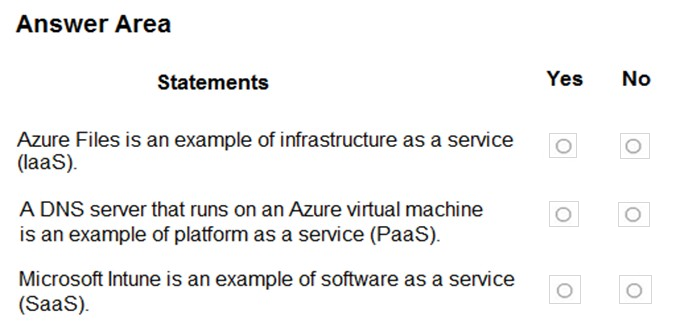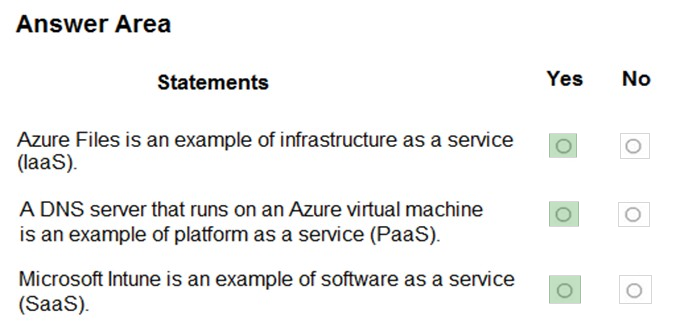HOTSPOT -
For each of the following statements, select Yes if the statement is true. Otherwise, select No.
NOTE: Each correct selection is worth one point.
Hot Area:

HOTSPOT -
For each of the following statements, select Yes if the statement is true. Otherwise, select No.
NOTE: Each correct selection is worth one point.
Hot Area:


Reference:
https://azure.microsoft.com/en-gb/overview/what-is-iaas/
https://azure.microsoft.com/en-gb/overview/what-is-paas/
https://azure.microsoft.com/en-gb/overview/what-is-saas/
I concur with the rest: Azure files is PaaS. DNS server on Azure VM is IaaS. So NNY.
Fully managed. Azure file shares can be created without the need to manage hardware or an OS. This means you don't have to deal with patching the server OS with critical security upgrades or replacing faulty hard https://learn.microsoft.com/en-us/azure/storage/files/storage-files-introduction So NNY
2)Yes, that is correct. A DNS server running on Azure virtual machines (VMs) is an example of Infrastructure as a Service (IaaS).
Answer is NYY as per google and chatgpt
Azure Files is a service not infrastructure, so PaaS
Okay, this one is a pain the a$$. My initial though was NNY but that is wrong. I'd go with YNY now. Somebody will have to do a better explanation on why the second is Yes for me to change that answer. 1. Azure Files is an example of infrastructure as a service. We can see this by following this link: https://azure.microsoft.com/en-us/overview/what-is-azure/iaas/?OCID=AID2200277_SEM_4f474f37105d10e7fe342e7811e71afe:G:s&ef_id=4f474f37105d10e7fe342e7811e71afe:G:s&msclkid=4f474f37105d10e7fe342e7811e71afe#products And going to the storage services link. We can see that yes, Azure Files is considered as Infrastructure as a Service. I am sticking with N as DNS server on an AZURE VM is Infrasturcture. You can google and you'll see references also to DNS set up as IaaS. You google DNS PaaS and you get zero, zilch. Microsoft Intune is totally Software as a Service. If you studied for the Microsoft 365 Fundamentals then this a give me.
Azure files and storage both are PAAS
Storage is not PAAS https://azure.microsoft.com/en-us/overview/what-is-paas/
I mean to say Storage accounts are PAAS. Storage which is Disk is an IAAS.
Storage account are not PAAS https://azure.microsoft.com/en-us/overview/what-is-paas/
Gli account di archiviazione sono PAAS.
Azure Storage is IaaS.
Thank you for that marvelous explanation. I feel confident about this question now and I think you're right.
I think it is YNY. The 1st one for sure is IaaS. Files is IaaS type of storage. DNS server is running on VM so leaning towards IaaS, which is why I say this is NO. and everyone agrees the last one is Y (no question here on this answer).
You are completely right! I indeed see Azure Files mentioned on the page that opens when you click on the "Storage" link.
And for the second see this page: https://www.poweradmin.com/blog/dns-in-the-cloud-solid-or-not/#:~:text=DNS%20in%20the%20cloud%20is,a%20Service%20(IaaS)%20solution. Stating: "DNS in the cloud is generally considered to be an Infrastructure as a Service (IaaS) solution."
So I think the answer is: Y - N - Y
Also, as with many other questions, anything "on an Azure VM" indicates that you need to deploy this VM, otherwise it won't be mentioned, so that alone indicates IaaS. DNS, like Intune, as standalone services (no hint about background infrastructure) are SaaS
It should be NNY
On exam 03-2024
Correct answer is: NNY Explaination: - Azure Files is a Platform as a Service (PaaS). It’s part of Azure’s managed services, meaning you don’t have to worry about infrastructure management, which is typically associated with Infrastructure as a Service (IaaS). - A DNS server that runs on an Azure Virtual Machine is an example of Infrastructure as a Service (IaaS). In this case, you’re managing the virtual machine and the DNS server software running on it. This is different from PaaS where the underlying infrastructure including the server software is managed by the cloud provider. - Microsoft Intune is a Software as a Service (SaaS). It’s a cloud-based enterprise mobility management (EMM) service that helps enable your workforce to be productive while keeping your corporate data protected.
Final Answer: NNY - Storage Account (IaaS) - Azure blob , azure files, azure queue, azure table are (paas) - VM (Iaas)
NO . NO . YES
I will go with YNY. Azure Files is a file storage service in Azure that offers fully managed file shares in the cloud accessible via the Server Message Block (SMB) protocol. Azure Files allows you to mount Azure file shares from cloud or on-premises deployments, making it a service that abstracts the underlying infrastructure and provides a platform-level capability. This aligns more with PaaS because it delivers a managed service that developers and IT professionals can use without having to manage the underlying infrastructure. In summary, Azure Files is better classified as PaaS rather than IaaS because it provides a managed file storage service that abstracts the complexities of the underlying infrastructure.
My bad, I meand NNY. Somehow I can't edit my answer even though it is awaiting for mderator approval.
How can something that runs on A VM be a platform as a service ?
NO, NO, YES
Azure file is Iaas DNS server on azure vm is iaas
Answer is NNY
Answer should be N N Y
No DNS services running on Azure Virtual Machines would typically fall under the category of Infrastructure as a Service (IaaS). In this setup, you're managing the virtual machines, including the installation, configuration, and maintenance of the DNS software, such as BIND or Windows DNS Server, yourself. No Azure File Share falls under the category of Platform as a Service (PaaS). It provides fully managed file shares in the cloud, eliminating the need to manage underlying infrastructure. Users can access Azure File Shares from anywhere using the industry-standard SMB protocol. Yes
Answer is Y N Y. 1. Azure Storage = Iaas 2. Anything Virtual & PaaS is FALSE ALWAYS 3. Microsoft Intune = SaaS
That completely depends on the definition and services and do not forget most of the cloud services have evolved to a model that blurs the line between IaaS and PaaS Azure Storage Services can be categorized under both IaaS and PaaS, depending on the use case. They are IaaS since Azure Storage Services provide the fundamental building blocks for cloud-based applications and services, where you get raw storage capacity (like a hard drive in the cloud) and are responsible for how you manage and utilize that capacity. They are PaaS since Azure handles all the infrastructure management, maintenance, and scalability, allowing users to focus on how they utilize the storage rather than managing the underlying hardware or OS. But according to the old definition and used cases you think most if the services under Azure Storage Services can be count under IaaS but some of them are more aligned with PaaS definiton. It's *NY.
Azure provides storage options for both IaaS and PaaS. It is dependent upon the particular Azure service you are referring to. Absolutely, it is regarded as a PaaS if you're referring to Azure's database services, such as Azure SQL Database. But if you're talking about simple storage services like Azure Files, Blobs, or Discs, those are usually categorised as IaaS since they offer virtual storage space without the extra platform functions associated with PaaS.